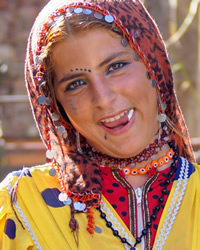The Romani people are often misunderstood. They have been called Gypsies because people thought they were from Egypt. That term has become derogatory. Romani call themselves Rom, which in their language means "men." Rom is derived from the Indian word Dom, meaning "a man of low caste who gains his livelihood by singing and dancing."
As the name suggests, Balkan Romani speakers are mainly in the Balkan nations. This dialect uses grammar from the Turkish language. Like other Romani languages, it has some influences from Greek. There are smaller populations in various parts of Europe, as well as in Algeria. One of their countries is Ukraine. Romani peoples were driven out of nearby Poland in the 1500s and settled in what is now Ukraine. They still have a high population in that country. Some live in Serbia.
Unlike the Romani who have remained in India, most Balkan Romani have become settled. They often live in segregated shanty towns without electricity or running water. Some still travel by caravans of cars, trucks, and trailers.
In the past, the Romani were not allowed to own land, so they began developing unique occupations which they still do today. These included fortune-telling, horse trading, market vending, entertaining, acrobatics, and metal and woodworking. They are primarily known for their musical talents and dancing abilities. Many sing and play instruments at weddings, baptisms, and festivals. Unfortunately, they are also known as beggars and thieves. Petty theft (usually by children), begging, and black market peddling sometimes provide families with income. This reputation has led to significant discrimination against them. In many countries, they are last in line for jobs. Some women work as domestic helpers but are paid low wages and given no health benefits. Many have insufficient housing and unsatisfactory medical attention.
Their unique lifestyle and appearance separate them from non-Romani. For instance, how a Balkan Romani wears his clothes comes across as a costume or as a statement. They sometimes use their cars as homes, shops or shrines. They work with skill but come across as eccentric.
Parents sometimes arrange Balkan Romani marriages, and young couples usually marry while in their mid to late teens. Often, they prefer to elope rather than to have a wedding ceremony. Purity before marriage is greatly valued by them, especially for women.
Wherever they live, the Romani people adopt the local religion. In Serbia, there is a Christian majority among the Balkan Romani population. Beneath the surface of organized religion, they usually maintain their religious traditions and beliefs. Some believe ghosts, lizards, and snakes are capable of harming humans and that people have the power to curse others by giving them the "evil eye." Others have come to true repentance in Christ, and they are following him.
Although they may be more opportunities for them in Serbia than in the Middle East and India, they all have one thing in common: the need for Jesus. Christ's followers can be Christ-bearers to these rejected people. It will take people who are willing to take risks for the Lord.
Pray that the Balkan Romani people will find love and acceptance through Christ, leading them to dedicate themselves fully to him.
Pray for a heartfelt dedication to Jesus Christ that will rise high above traditional beliefs.
Ask the Lord to raise up loving and dedicated people who are willing to share Christ with the Romani.
Pray that soon there will be a movement of Balkan Romani discipling others, spreading the fragrance of Christ far and wide.
Scripture Prayers for the Romani, Balkan in Serbia.
https://en.wikipedia.org/wiki/Balkan_Romani
Segmentation vs. consolidation: The example of four Gypsy groups in CIS, by ELENA MARUSHIAKOVA and VESSELIN POPOV
https://en.wikipedia.org/wiki/Romani_people_in_Serbia
| Profile Source: Joshua Project |














